
Oct 28, 2024
More than 200 International Lawyers Assisting Workers Network (ILAW) members gathered in Casablanca, Morocco, October 9 to 11 at their 2024 Global Conference to share ideas and to collaborate on legal strategies to promote and defend worker rights.
The Solidarity Center established the ILAW Network in 2018 as a way for pro-labor lawyers worldwide to bring together legal practitioners and scholars in an exchange of ideas and information in order to best represent the rights and interests of workers and their organizations wherever they may be.
ILAW lawyers working together have taken legal strategies that are successful in one country and deploy them elsewhere. In doing so, they have set new legal precedents that build a stronger foundation for the expansion of worker rights around the globe.
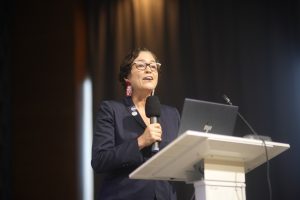
Credit: Mosa’ab Elshamy
Solidarity Center Executive Director Shawna Bader-Blau welcomed attendees, describing the network of over 1,300 members in more than 90 countries as “uniquely situated to take on global corporations suppressing worker rights.”
She cited the successful advocacy of women labor lawyers for new International Labor Organization (ILO) treaties, like Convention 189 on domestic workers and Convention 190 on violence and harassment.
Solidarity Center Rule of Law Director and ILAW Network Chair Jeffrey Vogt laid out the conference’s purpose. “Around the world, the rights of workers and unions are under attack. Employers are well-resourced and coordinated in their efforts to shape law and policy. It is essential that workers and unions do the same. Through ILAW, we can learn from each other, build from successes and failures, and strengthen our impact through legal solidarity.”
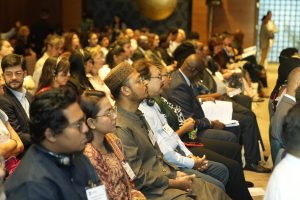
Credit: Mosa’ab Elshamy
The importance of interconnectedness was woven throughout many plenary sessions and discussions. Networking, learning from and collaborating across countries and regions was a key part of the conference, as attendees talked about the commonalities of their work.
The opening plenary, moderated by Solidarity Center’s Rule of Law Deputy Director Monika Mehta, focused on the impact of technology in the world of work, including but not only digital platform workers, from Amazon warehouses workers to content moderators for major social media firms.
Panelist Liz Lenjo described the content moderators in Kenya who filed a lawsuit against Meta (the parent company of Facebook, Instagram and Threads) and Sama, the local contractor, citing poor working conditions, union busting and inadequate mental health support.
These workers were hired to screen posts, videos and messages for Facebook and remove harmful or offensive content. Workers spent hours viewing violent and disturbing images and videos. They were left on their own to deal with the psychological trauma. In a landmark ruling, the Kenyan court determined it had jurisdiction over Meta.
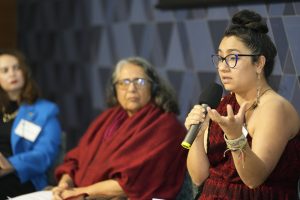
Credit: Mosa’ab Elshamy
Sandra Muñoz discussed how women in Colombia’s parliament recently passed legislation to harassment in the workplace and linked the fight for equality to equality for all. “Unless we can overcome inequality,” Muñoz said, “we can’t overcome inequality as a whole.”
Kayan Leung also described successful litigation she undertook in South Africa to establish parity in paid parental leave in order that the responsibility of care does not default to women. The ILAW Network filed an amicus brief in that case.
During the panel on Just Transition, Angelica Maria Palacios Martinez spoke about the efforts to get Colombia’s government to recognize trade unions’ essential role in Just Transition and protecting the whole population. “From the trade union world, we have called out the government to recognize us as a key player, she said, “so that these public policies are focused on protecting the entire population, and in particular, protecting the workers.”
Abdullah Nahid of the Maldives, one of the countries most affected by climate change, described union efforts to support workers in the tourism and fisheries sector.
On the panel on the informal economy, Madhulika Tatigotla discussed the growth of the informal economy in India. India’s informal economy continues to grow, as the formal sector continues to informalize as, for example, 40 percent of factory workers are now on temporary contracts. Recently, workers and their legal advocates developed a comprehensive draft law for workers in the informal economy to extend labor rights and benefits.
In the final right to strike plenary, Paapa Danquah noted the increasing international threats to the right to strike, linking it to civil liberties. “The attack on the right to strike on the international level is the first step to taking away the right to strike everywhere,” Danquah said. “Whenever you see attacks on the right to strike, there are also attacks on collective bargaining and civil liberty.” He described how the ITUC was involved in litigation before the International Court of Justice to protect the right to strike as a principle of international law.
As the conference ended, attendees discussed priorities for the coming year, from more collaboration between all members to deepening national and regional labor law networks, cross-pollination between ILAW regions, increasing engagement with social movements and Indigenous communities in order to support union growth. Attendees left the conference energized and committed to forging a robust labor law network for a stronger global labor movement.
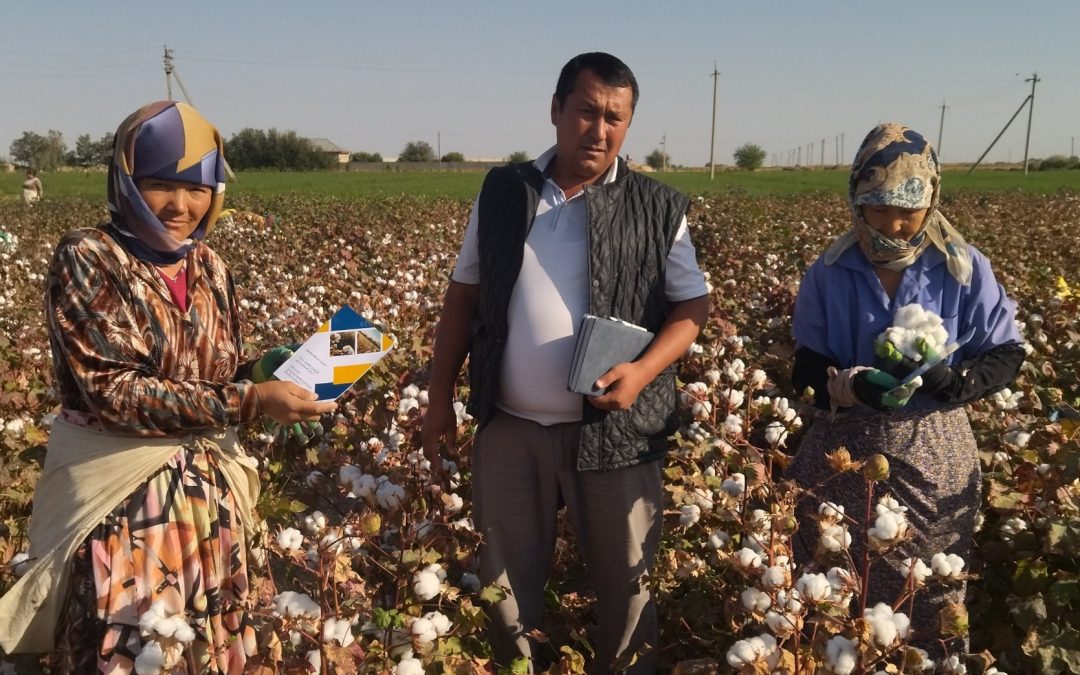
Oct 7, 2024
World Cotton Day – October 9, 2024: As ubiquitous as cotton is in our everyday lives, the workers who produce and harvest this foundational crop are often invisible. This was long the case in Uzbekistan, where for decades the government forcibly mobilized millions of people, sometimes including children, to harvest cotton for state-owned enterprises. A long-running global advocacy campaign led by the Cotton Campaign, of which Solidarity Center was a founding member, helped push the government to implement reforms that brought that system to an end in 2021.
Ending state-organized forced labor was a major accomplishment, but establishing just and equitable working conditions in the cotton sector is a longer journey. With support from the U.S. Department of Labor, the Solidarity Center is working to put in place building blocks that will allow workers to ensure their rights are protected. The Solidarity Center signed an agreement with the Ministry of Employment and Poverty Reduction of the Republic of Uzbekistan and the project’s co-implementing partner, the Center for International Private Enterprise (CIPE), in December 2022 to begin project work. As the 2023 harvest season gets underway, Solidarity Center and CIPE are working closely with stakeholders in government, civil society and business to work from the field up and from oversight authorities down to build knowledge within the cotton sector about fundamental rights and strengthen mechanisms to ensure those rights are secured.
For the 2023 harvest, this includes:
- In collaboration with the ministry’s labor inspection and legal team, the Solidarity Center and CIPE have prepared and printed more than 10,000 leaflets for distribution to cotton pickers during the ongoing harvest season. These leaflets provide cotton pickers with accessible and comprehensive information about their fundamental rights as seasonal workers under Uzbekistan’s Labor Code. The content covers essential worker protections and includes critical contact information, such as the Labor Inspection hotline and a project-run Telegram channel, where workers can anonymously report violations and seek free legal consultation. The leaflets have been also distributed to groups working in different regions across Uzbekistan to maximize outreach. This initiative plays a crucial role in raising awareness among seasonal workers, ensuring they are informed of their rights and the enforcement mechanisms available to them if their rights are violated. Providing clear and accessible information about legal protections and enforcement channels will be essential to empowering cotton workers to assert their rights, and increased awareness is critical to improving compliance with international labor standards, which is the route to creating a more sustainable and transparent cotton sector.
- The Solidarity Center, in partnership with the Tashkent Mediation Center and the State Labor Inspectorate, successfully conducted a two-day training session October 2–3 in Tashkent aimed at enhancing the capacity of mediators to resolve individual labor disputes. The training, facilitated by a regional expert, introduced participants to mediation as an alternative mechanism for labor dispute resolution. The comprehensive curriculum, a blend of theoretical knowledge and practical exercises, equipped 10 mediators from the Tashkent Mediation Center and Labor Inspection staff with the skills to mediate and effectively resolve individual labor disputes. The head of the Labor Inspectorate emphasized the importance of continued collaboration and capacity building as critical to providing workers in the cotton sector with an effective remedy for labor rights violations.
These harvest-period activities supplement an ongoing rights awareness and education program the Solidarity Center and CIPE are implementing with workers and employers in the cotton sector. A core priority of that program in the coming year will be to ensure that all workers in the cotton sector have a written employment contract with clear, enforceable conditions of work. Employment contracts are vital to healthy labor relations that, unfortunately, are absent in many agricultural supply chains.
Recent reforms in Uzbekistan requiring labor contracts for all workers in cotton production have the potential to help the country distinguish itself as a high-road option for textile sourcing, if those reforms can be implemented and enforced. Developing workplace-level reporting and monitoring systems for workers to verify their rights are being respected, and to seek remedy if they are not, will be an important next step to positioning Uzbekistan as a leader in developing sustainable and just textile supply chains.
Funding is provided by the United States Department of Labor under cooperative agreement number IL-38908-22-75-K, through a sub-award from the Solidarity Center. 100% of the total costs of the project or program is financed with federal funds, for a total of $1,018,814. This material does not necessarily reflect the views or policies of the United States Department of Labor, nor does mention of trade names, commercial products, or organizations imply endorsement by the United States Government.
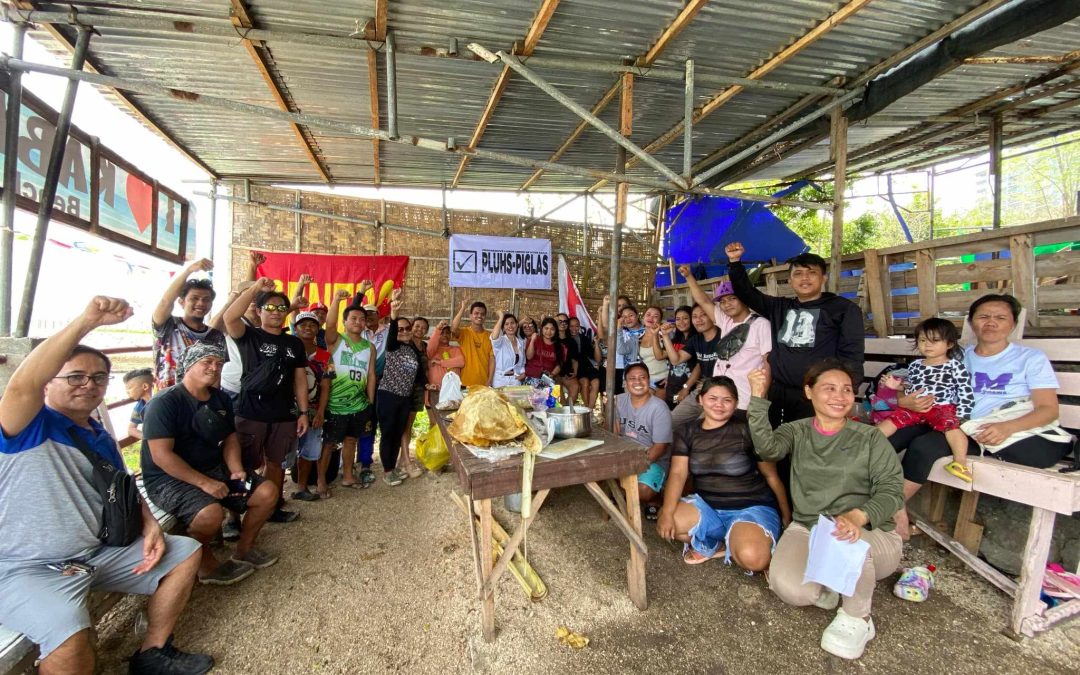
Oct 1, 2024
Organizing a union of more than 200 factory workers in an economic processing zone is a feat in itself, but doing so in just nine months amid management intimidation proves the power of solidarity.
On September 3, more than 60 percent of rank-and-file workers from Hyde Sails Cebu, Inc., a sail manufacturing company, voted union yes in their certification election, with high hopes of negotiating for better benefits and wage increases.
Lucil T. Loquinario, president of the Progressive Labor Union of Hyde Sails (PLUHS-PIGLAS), said earlier this year, “In a union, you will know the true stand and strength of a person,” adding that, “We want to dispel the myth that unions are bad or illegal.”
Fast forward to today, Loquinario noted constant education and pooling strength from each member as the main drivers of their victory. “It is better that all workers know their right to organize and know what we rightfully deserve as written in law. Since management does not let us know, it is only through this endeavor that I know the due process and defense we have as workers.”
The idea of forming a union came to Loquinario in December last year, when she was inspired by a friend who informed her of her rights as a worker. She started getting curious about the benefits her co-workers could be entitled to, along with the automatic 30-day suspension they are bound to when damages are found on manufactured sails.
Loquinario said their organizing started in January—with education seminars and friendly fireside chats with co-workers through May, when the majority of workers was already pro-union. However, word of a budding union reached management.
Loquinario detailed how management started calling them rebels, even installing a security camera in the workplace canteen a few days before the election date to allegedly intimidate workers who planned to vote union yes. She added that management appealed to the Labor department and accused the newly formed union of vote buying for passing out slices of bread to hungry voters after the election.
“It’s worse now,” she said. “Even with a five-minute lapse in break time, they sent a memo to my co-workers.”
Loquinario detailed how, after the election, management started increasing surveillance and demanding written explanations from workers who returned from break a few minutes late. “It is an unreasonable and unfair labor practice,” she said.
While these actions have caused delays in securing their collective bargaining agreement, Loquinario and the union remain hopeful, stressing the importance of having “lakas ng loob,” a Filipino adage for courage.
“We hope this has a good result where we can achieve our goals as workers in proper communication with management,” she said. “Because my co-workers are there, I have more courage to fight for what is right.”

Jul 26, 2024
More than 500 Philippine workers and trade unionists joined a march on July 22nd in Quezon City, demanding that President Ferdinand R. Marcos, Jr. declare support in his State of the Nation Address (SONA) for legislation that would further raise the minimum wage.
The Regional Tripartite Wages and Productivity Board approved a 35 PHP (approximately 0.60 US dollar) daily minimum wage hike for workers in the capital region earlier this month. This falls far short of the 150 PHP (about 3 US dollars) wage hike the National Wage Coalition has persistently called for to support workers’ economic recovery amid high inflation, poor job quality and a lack of new and decent jobs.
The Coalition, representing local workers across various industries and sectors, has remained steadfast in demanding livable wages and are advocating for multiple bills that have been introduced but still await action from the government.
The president has yet to engage in dialogue with Philippine Labor representatives and did not mention wages in his SONA.
Coalition member, Center of United and Progressive Workers (SENTRO), noted in an online statement, “[t]he [national government’s] absence of genuine effort to attain long-term solutions against rising costs and the provision of measly increases that leave workers running in place against inflation…” SENTRO added, “We deserve higher wages not simply because of our labor, but because we are human beings who have every right to live peacefully and decently.”
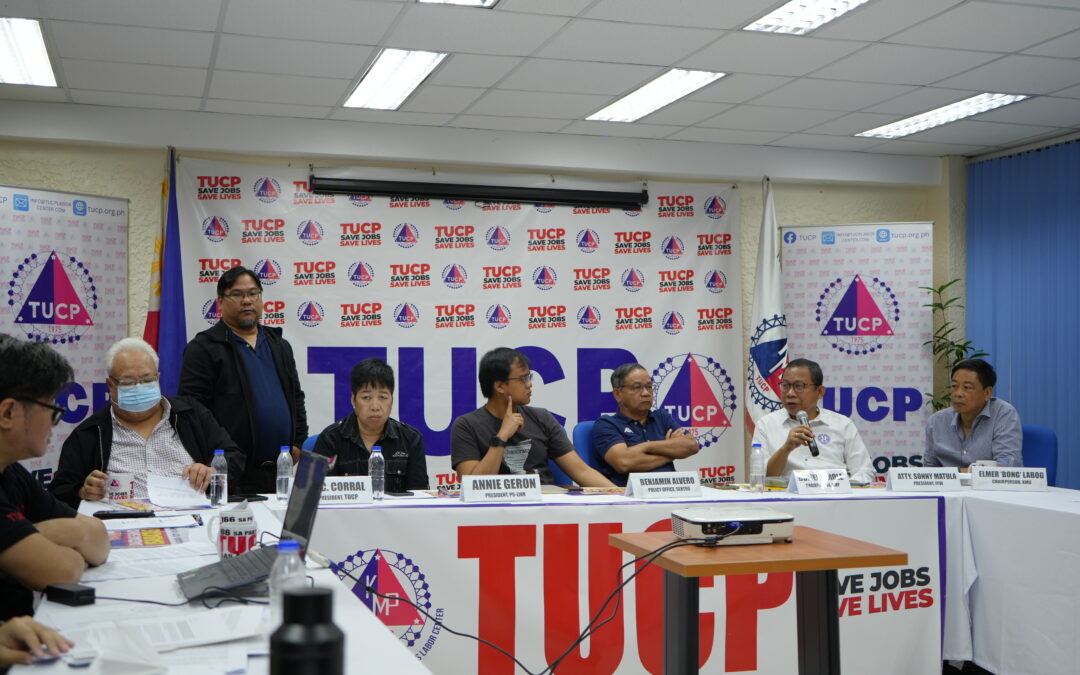
Mar 15, 2024
Philippine trade union leaders are calling for an across-the-board daily minimum wage increase in the private sector to alleviate the economic burden workers currently face.
House Bill No. 7871 calls for a wage hike of 150 PHP (approximately 3 US dollars). Amid high inflation, poor job quality and a lack of new and decent jobs, supporters argue that immediately passing and enacting the wage increase is critical to support workers’ economic recovery.
During a press conference in Quezon City on Thursday, Benjamin Alvero, chief policy officer of the Center of United and Progressive Workers (SENTRO) said, “This wage hike is not just a matter of economic development but also of justice. The wage hike that we currently have at the regional level is just to catch up with inflation, and that is not enough.”
“There is an urgency to pass this legislated wage hike as the first step in the right direction towards addressing the disparity between the family living wage standard and current minimum wage rates,” Philippine Labor representatives said in a joint statement.
Last month, the Philippine Senate approved a minimum wage increase–the first Congress-legislated wage hike since 1989—of 100 PHP (roughly 2 US dollars).








